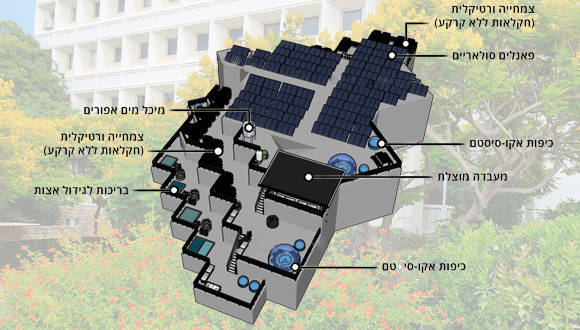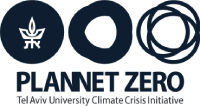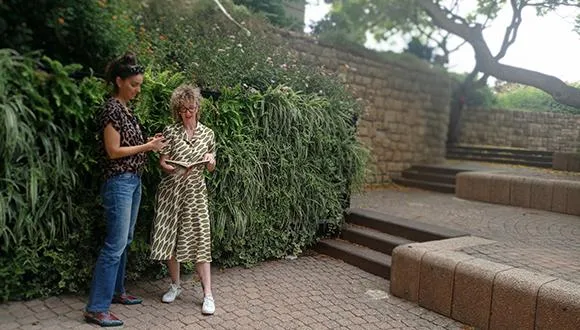The Naftali Building for Social Sciences
The Naftali building is the home of the Gershon Gordon Faculty of Social Sciences. It is one of the first buildings of Tel Aviv University, built in the 1960s.
Prof. Itai Sand, the faculty dean, lead plans to turn it into a green haven that will attract students from all faculties and all fields of research. Imagine walls covered with photovoltaic cells producing electrical energy, a roof with an open research laboratory and a garden with a green wall. Yet the physical transformation of the building is but the tip of the iceberg. "The building will facilitate cross-disciplinar climate research that span faculties, a center for ideas and solutions for environmental challenges." says Prof. Sand.
A laboratory that is not a laboratory
So what is it going to look like? The walls of the garden on the ground floor, which was once the home of the mythical cafeteria, are already covered with tropical vegetation that gives a feeling of a natural space. The garden will host academic meetings while the interior space will have workspaces with screens on the walls which will display data from the energy facilities in the building and from all the solar roofs in the university. It will be possible to see at any given moment how much alternative energy the university produces from all the roofs.
There will also be a facility for implementing soilless agriculture, whose produce will provide fresh food for the new cafeteria. The cafeteria will be run by at-risk teenagers, guided by social work and psychology students.
The water to irrigate the green wall and the agricultural endeavor will be extracted from the Tel Aviv air, which has been proven suitable for drinking, On the roof of the Social Sciences Library, will be located gray water purification laboratories and wind energy facilities. Solar panels will cover the south wall of the building, but the real focus is the lab. A 'laboratory without a laboratory', as Prof. Sand calls it, which will be managed by Prof. Hadas Maman, head of the Environmental Engineering program at the Faculty of Engineering, and Prof. Vered Blass from the Department of Environmental Studies, who specializes in the circular economy.
"The laboratory resides in the minds of the students and researchers," explains Prof. Sand. "The idea is to connect the whole world with the whole world, in an open space, where everyone is constantly enjoying life. The spaces must be open. It is impossible to continue working with closed laboratories. We are building a unique program here. Our goal is to train the leaders of the future to deal with the climate and water crises, to create a sustainable future. Students of engineering, economics or psychology will wander and coduct experiments on the plants that climb our walls, on the water machine that will be on the roof and on the photovoltaic cells that will be installed on the walls of the building."

Design of the roof. Vertical vegetation, solar panels, ecosystem domes, shaded laboratory, gray water tank and ponds for growing algae
A flow of thought
The students who participate in the revolutionary 'lab without lab' program are Israeli and international master's degree students. "They learn here how to do special things in the most remote places in the world, but they need freedom. This is a new era. These are children who grew up in a world where there are no borders. There is no engineering faculty, there is no law faculty. There are young people and they move around, they are here and there and they go and come back", Prof. Sand shares his reasons for establishing the special project.
"You will see here veterans of elite army units, who travel to the most remote villages in the world, together with someone from the Faculty of Life Sciences, someone from the School of Computer Science, students from the Faculty of Social Sciences - from economics, public policy, etc., and someone from psychology and anthropology. They travel to these villages because that is what they like to do and explore. They will not sit down to write a doctorate dissertation here for five years. It would be torture for them, it doesn't suit them anymore. But if we put them in the new kind of lab, they'll get a PhD after doing a lot more. That's the guiding idea."
An entire generation is searching for meaning
Prof. Sand knows that it all sounds "horribly like engineering and life sciences", but according to him "most of the things that are done here are actually related to social science. "It is important for our students to know, right from the beginning, where they will be able to fit in when they finish their degree. With us, in these projects, they fit in as they go. Because if that student went to Kenya to purify water or to install solar cells, and someone has already seen and redirected him - he is already on his way to another project. That's how it works."
"We did it all the time. But now the Green Naftali will give us a 'focal point', within the university. We will continue to tie all the connections of Green (green energy), and Gray (gray water), with the best students that want to do something meaningful. The thing this generation lacks most is meaning, and if you come and convince it that you have something meaningful - it will come. That's how you get the most talented students, and when you have them - it doesn't matter where they study and good things will come out of it."
"The infrastructure that we are building here is just 20% of the matter, and that is what is visible to the eye. But what is interesting is the other 80%, which are the minds. And they have no limit. The route to them already exists. We needed something that could be seen with the eyes, so we built Naftali Green. Now they will finally see them. My vision is that during the day they will study, at night they will sit on the roof of the library, the students from the music school will come and play jazz here. On the one hand the students will sit, on the screen there will constantly be an event happening in Kenya, or in India or somewhere else All this will happen all the time," Prof. Sand concludes.


